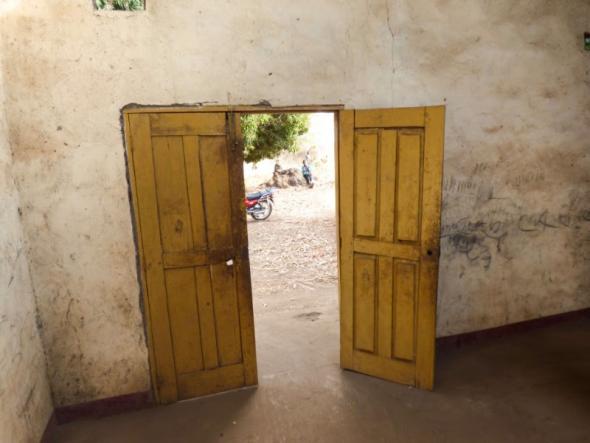Stone, cotton or oil
— Look, look at this! This is what we were talking about. Fingers eager to force open the sack, tilt it towards me, to snatch handfuls of the reddish cotton, covered in dirt. The bag vomits up a stone, then another. An adobe brick. Laughter. The middleman tells them to look for the other bags with the same name on the outside. They have already been weighed and put into the truck.
—There are three bags. This one and two more. We need the other two. The guy loading the truck finds the sacks quickly. He drags one to the edge of the container, and holds it there as though he were holding on to a prisoner with his hands tied behind his back in the dark. He gives the sack a shove and takes a step back. It sways, and then crashes down. The other guy loading begins to empty it, throwing handfuls of cotton onto the ground. This bag also has a core of chestnut earth and stones; it looks like a miniature Earth, with its nucleus of mineral circled by a thin band of organic matter, all girded and imprisoned by something man-made, the jute sack. The first guy holds out the evidence of the crime in his open hand, and asks “do you want to take a photograph?” Everyone stands around us, shouting and groaning as new rocks emerge. I take photos and everyone watches at me. In the corner of my eye, a third man bends over the third sack as it falls and sinks a sharp iron rod into its belly, as though he were stabbing a fallen enemy. He examines the iron, as though looking for blood.
 Muaua | 2017 | Paulo Faria (courtesy of the artist)
Muaua | 2017 | Paulo Faria (courtesy of the artist)
I ask how they found out and the foreman tells me:
—We have a technique. The sacks with sand and stones in don’t skid when we throw them on the ground after weighing them. Some people wet the cotton. The bag dries on the outside after two or three days, but stays much heavier. If the cotton is wet, the sack also doesn’t skid. (I note that he says ‘salt’.) That’s how we found out. (What he is saying is the truth is light, ethereal, whereas lies are heavy. Is that it?) On the ball, eh?
A woman and a young man line up in front of the wreckage like pupils caught cheating. The middleman gestures, he is telling them off.
The boy comes up to me without my hearing, his bare feet light on the bare earth. —I’m asking you, talk to them.
He wants me to intervene for him, he wants to separate the earth and stones from the cotton as quickly as possible, to remove the mineral from the organic, to purify himself, and to wash away the sin of contamination. He wants to sell his annual production today, turn it into cash, maybe three thousand meticais (forty euros). I tell him I’m friends with the factory manager, that I just came to take pictures. That I can’t get mixed up with the work on the ground, or the boss will get cross with me. I came to see what life is like for poor people. I don’t say that part. I came to see where the cotton in my socks comes from. I don’t say that either. I came looking for some kind of truth.
—Please, I’m asking you.
I repeat my arguments, my refusal. I can’t be the judge, I am a white man in Niassa, it is not for me to forgive, to intervene. I am not part of this truth and this lie, I don’t know to orient myself in this place. He gives up, goes back to the woman. They do not touch the fallen sacks, they wait, hands crossed in front of them, heads down.
It starts to rain. The first drops raise a cloud of red dust from the ground, then comes the downpour and the mud. People shelter under the tree, and go in one by one to the hut where the accounts are sorted, and come back out holding folded notes. The boy and the woman crouch down and start picking up the scattered swatches of dirty cotton from the soggy ground, stuffing them back into the sacks. The boy leaves with a sack on the back of his bike, the woman walks to the road outside. The stones and the bricks stay where they fell.
—They were a mother and son. She said it wasn’t her, that the husband did it. But we have already closed the file, we can’t weigh more cotton now. We’re already processing the payments. I ask why everybody laughed.
—They know they’ll do the same tomorrow. Much misery, many difficulties.
Streams of water trickle from the cotton sacks packed onto the truck, on a high wall. The load no longer weighs only eight tons, it weighs much more, but the accounts are settled, so it doesn’t matter. In my sweater, in my socks, the cotton fibres intertwine with threads of oil. If the truth is light and lies are as heavy as lead, the truck, wobbling at five miles an hour down the steep road, is carrying a great load of lies. But perhaps it is the opposite, that lies are light and the truth is heavy. In the eight hours I spent in the village, the price of a barrel of oil fell by a dollar.
_________________
Article produced for project MEMOIRS – Children of Empire and European Postmemories, funded by the European Research Council (ERC) under the European Union’s Horizon 2020 research and innovation programme (grant agreement No 648624).